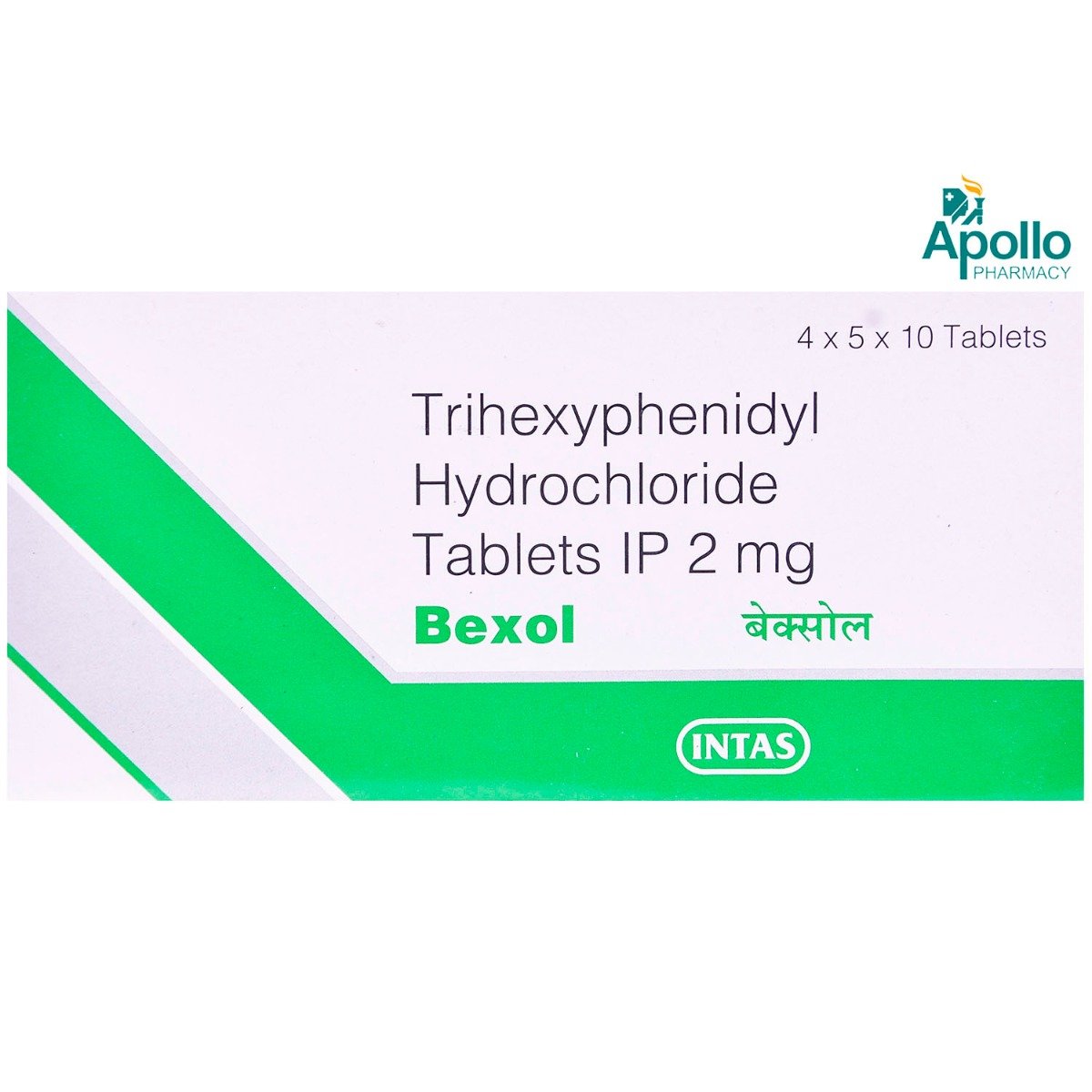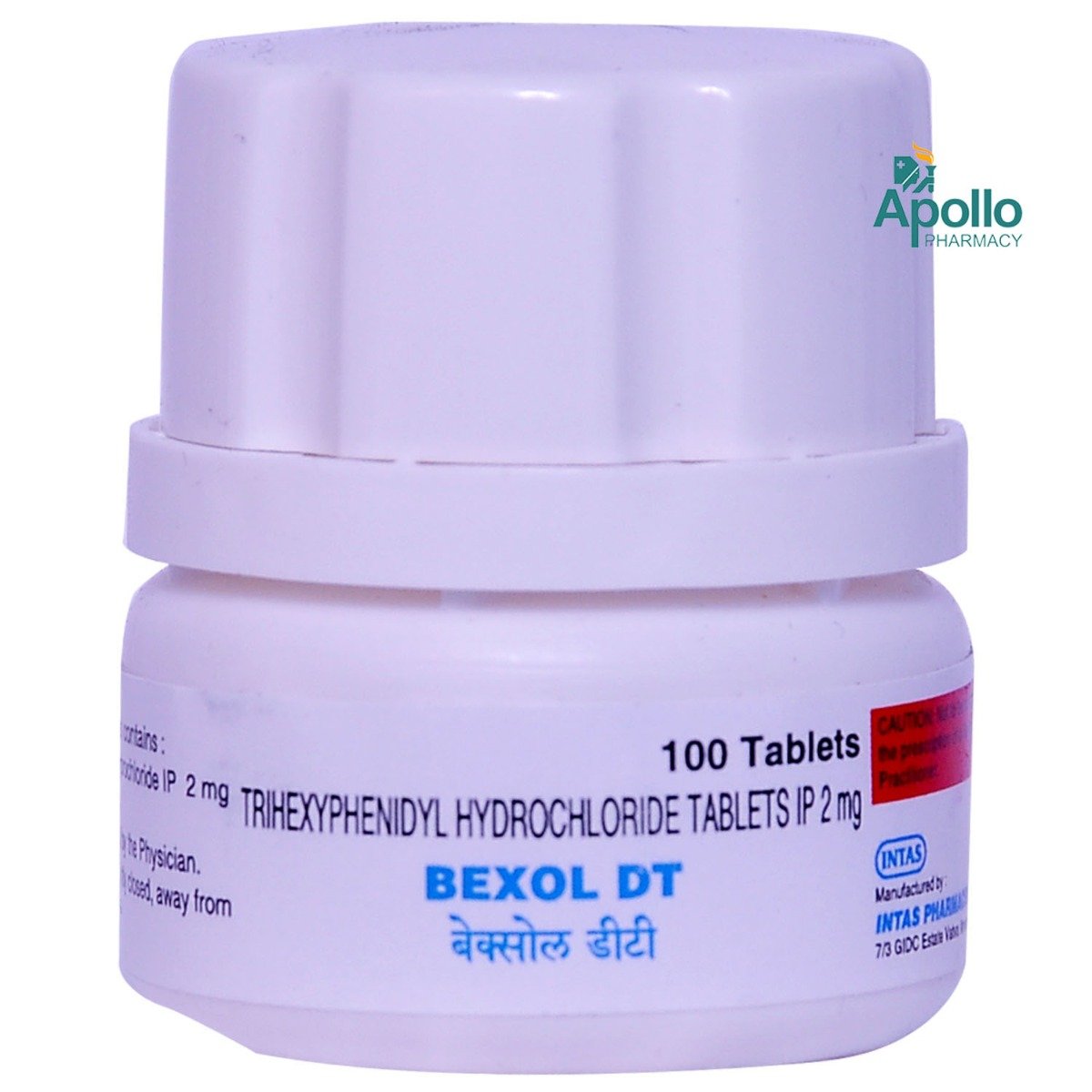Trihexyphenidyl Hydrochloride
About Trihexyphenidyl Hydrochloride
Trihexyphenidyl Hydrochloride belongs to a group of medicines called anti-spasmodic agents used as an adjunct to treat Parkinson’s disease and extrapyramidal symptoms (drug-induced movement disorders). Parkinson’s disease is a progressive neurological disorder in which the first signs are problems with movements.
Trihexyphenidyl Hydrochloride contains ‘Trihexyphenidyl hydrochloride’, which works by relaxing the muscles and nerve impulses that control muscle functioning. Besides this, Trihexyphenidyl Hydrochloride also balances chemical messengers called neurotransmitter in the brain, thereby improves muscle control and reduces stiffness, thus helps the muscles move naturally.
You are advised to take Trihexyphenidyl Hydrochloride for as long as your doctor has prescribed it for you, depending on your medical condition. Sometimes, you may experience certain common side effects such as nausea, vomiting, dizziness, constipation, weakness, headache, dry mouth, decreased urination, drowsiness, and feeling nervous or restless. Most of these side effects do not require medical attention and will resolve gradually over time. However, you are advised to talk to your doctor if you experience these side effects persistently.
Do not discontinue Trihexyphenidyl Hydrochloride on your own. Consult your doctor before taking Trihexyphenidyl Hydrochloride if you are pregnant or breastfeeding. Trihexyphenidyl Hydrochloride may cause drowsiness and dizziness, do not drive unless you are alert. Trihexyphenidyl Hydrochloride is not recommended for children as safety and effectiveness have not been established. Avoid consuming alcohol with Trihexyphenidyl Hydrochloride as it could lead to increased drowsiness and dizziness. Keep your doctor informed about your medicines and health condition to rule out any side effects.
Uses of Trihexyphenidyl Hydrochloride
Medicinal Benefits
Trihexyphenidyl Hydrochloride contains Trihexyphenidyl hydrochloride, an anti-spasmodic agent used to treat the symptoms of Parkinson’s disease and extrapyramidal symptoms (drug-induced movement disorders). Trihexyphenidyl Hydrochloride exerts a direct inhibitory effect upon the parasympathetic nervous system. It works by relaxing the muscles and nerve impulses that control muscle functioning. Trihexyphenidyl Hydrochloride improves muscle control and reduces stiffness, thereby helps the muscles move naturally. Trihexyphenidyl Hydrochloride is used as an adjuvant therapy along with levodopa to treat Parkinson's disease. Additionally, Trihexyphenidyl Hydrochloride is used to control drug-induced movement disorders caused by CNS drugs such as dibenzoxazepines, thioxanthenes, phenothiazines, and butyrophenones.
Directions for Use
Storage
Side Effects of Trihexyphenidyl Hydrochloride
- Nausea
- Vomiting
- Dizziness
- Constipation
- Weakness
- Headache
- Dry mouth
- Decreased urination
- Drowsiness
- Feeling nervous or restless
Drug Warnings
Do not take Trihexyphenidyl Hydrochloride if you are allergic to any of its contents or if you have narrow angled glaucoma. Do not discontinue Trihexyphenidyl Hydrochloride on your own. Inform your doctor before taking Trihexyphenidyl Hydrochloride if you have glaucoma, prostate problems, urination problems, stomach ulcers, acidity, myasthenia gravis (muscle problems), tardive dyskinesia (involuntary facial movements), alcoholism, high blood pressure, heart, liver, or kidney problems. Do not take Trihexyphenidyl Hydrochloride if you are pregnant or breastfeeding unless prescribed by the doctor. Trihexyphenidyl Hydrochloride may cause drowsiness and dizziness, do not drive unless you are alert. Trihexyphenidyl Hydrochloride is not recommended for children as safety and effectiveness have not been established. Avoid consuming alcohol along with Trihexyphenidyl Hydrochloride as it could lead to increased drowsiness and dizziness.
Drug Interactions
Drug-Drug interactions: Trihexyphenidyl Hydrochloride may have interaction with antipsychotic (aripiprazole, lurasidone, olanzapine, risperidone, quetiapine, trifluoperazine), MAO inhibitor (rasagiline), antihistamine (diphenhydramine), anti-cholinergic (benztropine), anti-convulsant (clonazepam, lamotrigine, pregabalin), anti-depressants (escitalopram, duloxetine) anti-anxiety (alprazolam), and mild pain killers/fever-reducing agent (acetaminophen).
Drug-Food interactions: Avoid consuming alcohol along with Trihexyphenidyl Hydrochloride as it might increase dizziness, and drowsiness.
Drug-Disease interactions: Trihexyphenidyl Hydrochloride may have interactions with disease conditions such as arrhythmia (irregular heartbeats), autonomic neuropathy (nerve damage), gastrointestinal obstruction, glaucoma, urinary obstruction, infectious diarrhoea, tardive dyskinesia (involuntary facial movements), psychoses, high blood pressure, and fever.
Drug-Drug Interactions Checker List:
Safety Advice

Alcohol
unsafeAvoid consumption of alcohol while taking Trihexyphenidyl Hydrochloride as it may cause increased dizziness and drowsiness.

Pregnancy
cautionTrihexyphenidyl Hydrochloride belongs to pregnancy category C. Please consult your doctor before taking Trihexyphenidyl Hydrochloride if you are pregnant or planning for pregnancy. Your doctor will prescribe only if the benefits outweigh the risks.

Breast Feeding
cautionIt is unknown whether Trihexyphenidyl Hydrochloride passes into breastmilk. Consult your doctor before taking Trihexyphenidyl Hydrochloride if you are breastfeeding.

Driving
unsafeTrihexyphenidyl Hydrochloride may cause dizziness, drowsiness and blurred vision. Avoid driving and handling machinery if you experience these symptoms.

Liver
cautionDose adjustment may be needed in patients with liver impairment. Please consult your doctor if you have a liver impairment or any concerns regarding this.

Kidney
cautionDose adjustment may be needed in patients with kidney impairment. Please consult your doctor if you have kidney impairment or any concerns regarding this.

Children
unsafeTrihexyphenidyl Hydrochloride is not recommended for use in children, as the safety and effectiveness have not been established.
Habit Forming
Diet & Lifestyle Advise
- Maintain a healthy diet and exercise regularly.
- Include a diet rich in iron, folate and magnesium.
- Regularly attend therapy sessions.
- Perform meditation and yoga.
- Follow a regular sleep pattern.
- Avoid smoking and alcohol consumption.
- Learn about your condition, understand the risk factors and follow the doctor’s treatment plan.
Special Advise
- Take Trihexyphenidyl Hydrochloride at least 2 hours after taking ketoconazole and antidiarrheal medicines as it may prevent the full absorption of trihexyphenidyl. Besides this, Trihexyphenidyl Hydrochloride may prevent the complete absorption of antifungal agents like ketoconazole when these medicines are taken together.
- Talk to your doctor immediately if you experience hallucinations.
- Take special care with your dental hygiene while using Trihexyphenidyl Hydrochloride (like brushing, flossing) and have regular dental check-ups.
Patients Concern
Disease/Condition Glossary
Parkinson’s disease: It is a progressive neurological disorder in which the first signs are problems with movements. Dopamine is a naturally-occurring neurotransmitter in the brain which is reduced or absent in people with Parkinson’s disease. Due to this, problems arise with smooth and coordinated movements. Symptoms include decreased ability to smell, stooped posture, changes in voice, constipation, small/ cramped handwriting, tremor, slow movements, stiffness of arms, legs, trunk, and balance problems.
FAQs
Trihexyphenidyl Hydrochloride works by relaxing the muscles and nerve impulses that control muscle functioning. It improves muscle control and reduces stiffness, thereby helps the muscles move naturally.
Dry mouth could be a side-effect of Trihexyphenidyl Hydrochloride. Limiting caffeine intake, avoiding smoking and mouthwashes containing alcohol, drinking water regularly, and chewing sugar-free gum/candy might help in stimulating saliva and thereby prevents drying of the mouth.
Trihexyphenidyl Hydrochloride should be used with caution during hot weather as it may increase the chance of having a heat stroke. Trihexyphenidyl Hydrochloride can cause decreased sweating which results in a rise in body temperature (hyperthermia). This profound side effect is more significant in hot weather, so it is advisable to drink plenty of fluids, especially in summer. Inform your doctor if you have heat intolerance or fever.
Antidepressants should be avoided while taking Trihexyphenidyl Hydrochloride as it might increase sedative effects. Consult your doctor before taking Trihexyphenidyl Hydrochloride if you are using anti-depressants.
Trihexyphenidyl Hydrochloride may cause hallucination in some cases if taken for a prolonged time. Hallucination is a medical condition in which the person may feel, hear or believe things that are not true, see things that are not there, or feel unusually suspicious or confused. If you experience hallucinations while taking Trihexyphenidyl Hydrochloride, please talk to your doctor immediately.
Constipation may occur as a side-effect of Trihexyphenidyl Hydrochloride. Try eating foods that encourage a bowel movement. Consult your doctor if you experience excessive constipation.
Consult your doctor before taking Trihexyphenidyl Hydrochloride if you have glaucoma. Trihexyphenidyl Hydrochloride is contraindicated in patients with narrow-angle glaucoma. Trihexyphenidyl Hydrochloride may cause blindness on long-term use in case of patients with narrow-angle glaucoma.







